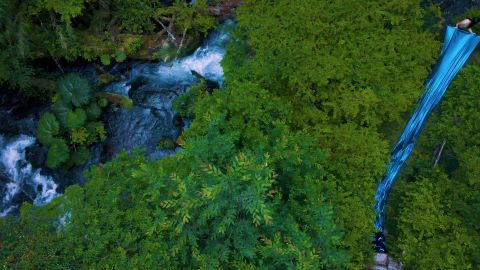A Participatory Planet
Relational Paths Towards Environmental Justice
November 2023–December 2024

Seba Calfuqueo, TRAY TRAY KO (2022), video performance
In many places, debates on the environmental crisis oscillate between climate anxiety and top-down solutions, leaving little room for active and participatory approaches that include those most affected. A Participatory Planet seeks to mend the gap between the desire for centralized regulation and a feeling of climate fatigue. It does so by inviting those already practising and developing participatory and relational ways of living on and with the planet. These practitioners emphasize connections between humans, non-human beings such as bacteria, mycelia, animals and chemicals, and the planet they equally cultivate and inhabit. Tracing the various strands that have led to the environmental crisis, the programme addresses collaborative solutions to battle those factors, and problematizes the injustices involved in current approaches. The series A Participatory Planet moves along four interconnected phases: Unearthing, Growing, Consuming, Discarding. Each phase is addressed over a four-month period through public scientific, educational, political, and cultural events. In addition, the phases are conceived as mentoring spaces. Throughout each phase, local individuals and collectives seeking innovative ways to challenge ecological crises are invited to collaborate with specialists on a global scale. Through such collaboration, the participants develop bottom-up methodologies of learning and doing that are oriented towards liveable relations with the planet. While Unearthing describes a conceptual phase of seeking out central questions targeting ecological (in-)justice, Growing, Consuming, and Discarding function as conceptual tools that challenge norms such as monoculture, food distribution, extractivism, and cultures of disposability.
What are historical and contemporary practices that can strengthen a collective shift towards environmental agency? Can exploring paths not yet taken generate new ideas? How can the multiplicity of bodies, voices, and experiences be heard while grappling with the ways in which the environmental crisis is differentially felt and distributed across the globe? Indeed, the environmental crisis cannot be divorced from questions of justice and equality.
A Participatory Planet seeks to address these questions together with activists, practitioners, cultivators, and thinkers who advocate for bottom-up solutions that lead to methods of shared learning and collective action against environmental injustice. These methods include affective reflection and thinking through participatory and relational ways of living together that, at the same time, confront systemic and structural contexts and issues.
While the dependency on the earth and its resources cannot be undone, the proposition underlying these methods is that the conditions of such relations are historical, situated, ambivalent, and thus, always negotiable. It is this negotiation that we hope to begin on different terms. Through performances, workshops, and conversations, the programme proposes embodied methods of learning as transformative pathways out of crisis. It further supports young local practitioners through an evolving mentorship programme that allows for cross-disciplinary exchange with invited experts.